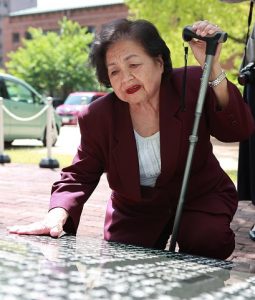Hiroshima Voices: “No Nukes, No War” Setsuko Thurlow, 91, A-bomb survivor, Toronto, Canada
May 18, 2023
Do not use A-bombed city as venue to pledge enhancement of nuclear deterrence
by Yumi Kanazaki, Staff Writer
When Setsuko Thurlow was a second-year student at Hiroshima Jogakuin Girls’ High School (present-day Hiroshima Jogakuin Junior and Senior High School, located in the city’s Naka Ward), she experienced the atomic bombing of Hiroshima 1.8 kilometers from the hypocenter. For roughly half a century, Ms. Thurlow has worked consistently to communicate to people in North America her A-bombing experience and to campaign against nuclear weapons. In 2017, she spoke at the Nobel Peace Prize awards ceremony when the International Campaign to Abolish Nuclear Weapons (ICAN), a global non-governmental organization, was awarded the prize. For the summit meeting of the G7 (attended by the Group of Seven industrialized nations), she will resoundingly convey “Hiroshima voices,” which represent a call to free the world from nuclear weapons and war.
Click here to view the video
The summit will be an opportunity for leaders of countries that rely on nuclear weapons to mourn the victims of the atomic bombing in front of the Cenotaph for the A-bomb victims, which is inscribed with the words, “Let all the souls here rest in peace; For we shall not repeat the evil.” That act in itself is full of contradictions, but I hope the leaders, as human beings, will face the victims without speaking in superficialities as politicians. As someone who lost many classmates and relatives in the bombing and vowed to “live with the dead,” I sincerely hope that is possible.
However, looking at the Hiroshima Action Plan, Japanese Prime Minister Fumio Kishida’s nuclear disarmament proposal, and the agreement from the recent G7 (Group of Seven industrialized nations) Foreign Ministers’ Meeting, I am not optimistic. Leaders of the G7 countries, including Japan, call for a world free from nuclear weapons without offering specifics, while at the same time claiming that nuclear weapons are needed to protect themselves and their allies. But, for us, nuclear weapons are an absolute evil. We have insistently argued that the abolition of nuclear weapons is the only hope for humanity’s continued existence. The difference in meaning and weight between their use of the term “abolition” and ours is stark.
Russia persists in its brutal invasion of Ukraine and threats to use nuclear weapons. Russian President Vladimir Putin must never be forgiven for this. There is no excuse for such aggression and the taking of human life. The situation is particularly difficult for me as someone whose late husband, Jim, had a relative of Ukrainian descent.
I want to convey to Prime Minister Fumio Kishida, who will serve as chair of the G7, to make sure Hiroshima does not end up merely serving as a venue from which to criticize Russia. If the summit results in a pledge to strengthen nuclear deterrence, putting aside the fact that all seven countries themselves rely on nuclear weapons, the gathering would be akin to a betrayal of the A-bombed cities.
Two years ago, the Treaty on the Prohibition of Nuclear Weapons (TPNW) entered into force in what was a historic achievement for the world. Nevertheless, Japan and the other G7 countries have been obstinate in turning their backs on the treaty. Still, contributions can be made by those nations. Discussions have begun on the creation of a fund to support countries affected by the testing of nuclear weapons. Even nations that are non-parties to the treaty are able to provide funding.
The United States, the United Kingdom, and France repeatedly engaged in nuclear testing after World War II, causing widespread damage. Joining the expanded G7 summit in Hiroshima are India, a nuclear-armed country, and Australia, a country that hosted British nuclear testing. Both countries are home to people who continue to suffer. Can countries that do not take responsibility for their own mistakes involving nuclear weapons seriously pursue the abolition of such weapons? The A-bombed country of Japan should take the lead in a proposal to provide funding.
I am putting my faith in citizens’ activities. Students, adults, and members of the general public are taking advantage of the opportunity presented by the summit to gather and communicate recommendations for related policy. I will keep a close eye on those activities in Hiroshima while I am back home in Hiroshima. I hope to collaborate with them in raising our voices. When I was visiting the United Nations, I felt acutely the arrogance of the great powers, which pursue power and profit on the strength of their economic power and military might, including nuclear weapons. There is no need to surmise that the leaders’ jobs are hard. We should not be afraid to confront those in power with our words.








